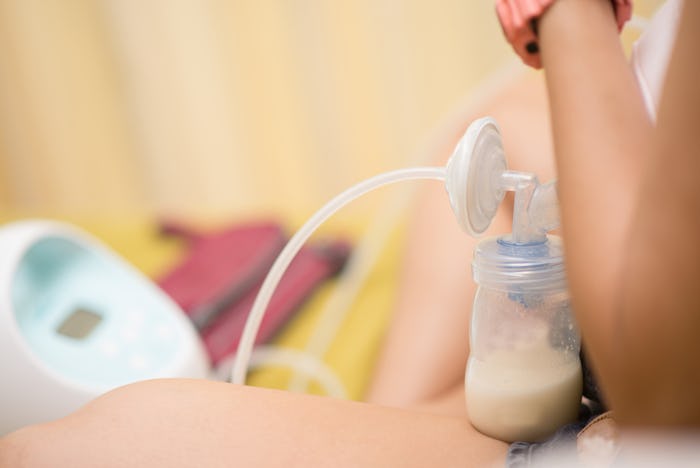Life

Sorry, But There's Only One Scenario When You Need To Pump & Dump
You've gone nearly a year without a sip of "the good stuff" (i.e. your alcoholic drink of choice) and finally, finally, you feel ready for a small glass of whatever you've been missing. With that seemingly innocuous glass comes a host of confusing questions if you're breastfeeding, though. For example, how will a drink affect breast milk? Or your baby? Turns out, there's only one scenario when pump and dump helps, and it's not the scenario prevailing old wives tails would have you believe.
Some breastfeeding moms operate under the myth that the final step to clearing alcohol from their milk supply is to pump it out and throw it away. There's some real faulty medical logic happening right here, so let's clear that up. As La Leche League's website explains, "As alcohol leaves the bloodstream, it leaves the breast milk. Since alcohol is not “trapped” in breast milk (it returns to the bloodstream as mother’s blood alcohol level declines), pumping and dumping will not remove it."
According to La Leche League, pumping and dumping does not, as some think, speed up the rate at which alcohol is eliminated from your milk. Other things that won't help speed up the sobriety process include, as La Leche League points out, drinking coffee, drinking a lot of water, and resting. Sorry to be the bearer of bad news, but at least you won't feel the need to attach yourself to a pump after a glass of rosé, right?
So how is a mama supposed to hurry along the process of getting alcohol out of her system? Unfortunately, you can't. It is simply a waiting game. Luckily there are some ways to monitor the amount of alcohol breastfeeding moms consume and how long they should wait before nursing. The Mayo Clinic's website advises that if a breastfeeding mom chooses to drink, it would typically take two to three hours for 12 ounces of 5 percent beer, 5 ounces of 11 percent wine or 1.5 ounces of 40 percent liquor, depending on your body weight. These are roughly the same quantities that the website Healthy Children uses in its definition of the term "drink" when discussing how harmful a single "drink" is to a baby. (And according to Healthy Children, having one drink will probably not harm your baby.)
Since pumping and dumping isn't going to be your magic bullet, there are some other things that might be helpful to consider in advance of imbibing your drink of choice. For example, the American Academy of Pediatrics (AAP) advises breastfeeding moms to drink right after (not before) breastfeeding an infant or pumping. If you have an alcoholic drink right after a pumping session or nursing session, the alcohol will have more time to clear your breast milk during the regular amount of time you would have taken between nursing sessions anyway. The website Baby Center also suggests timing your drink during one of your baby's longer stretches of sleep.
Before drinking any alcohol at all, every breastfeeding mother should first consider their infant's age and their own weight. As La Leche League points out, newborns have immature livers and, as a result, will be more affected by alcohol. Up until a baby is around 3 months old, they metabolize alcohol at about half the rate of adults. As for your own weight, a heavier person can metabolize alcohol faster than a lighter person. Of course, drinking enough alcohol to impair your own natural reflexes is a terrible idea (especially if you're bed-sharing, which could lead to tragic consequences).
Although many articles say that occasional drinking of a breastfeeding mother is not harmful to a baby, habitual use of alcohol while breastfeeding is not advised. The AAP explains that studies show there are some real negative effects of chronic alcohol consumption by the breastfeeding mother, including a decrease in the amount of milk your baby drinks and a change in the taste of the breastmilk, which could make your baby not want to breastfeed as much and cut back on the amazing benefits that breastfeeding can have on a baby.
So what's the deal with pumping and dumping? Why do it at all, if it doesn't help with getting rid of alcohol in your milk or speed the process along? As the Mayo Clinic explains, it does serve some helpful purposes. One, if you're going to miss a breastfeeding session while you're waiting for that alcohol to clear out, pumping and dumping will help you maintain your milk supply. And two, it can help you avoid engorgement. Basically, you'll want to pump and dump for comfort. And when you're a breastfeeding mama, enduring all the daily challenges that may come with that title, you deserve a little relief — whether it comes in a glass or the whir of a motorized breast pump.